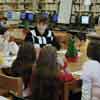 |
 |
 |
 |
 |
 |
Beyond Technology:
Questioning, Research
and the Information Literate School
|
||||||||||
| .Table of Contents | |
| .Part One The Primacy of Questions |
|
| Introduction | |
| Chapter One | Questions: The Greatest Technology of All |
| Chapter Two | Research Programs for An Age of Information |
| Chapter Three | A Questioning Toolkit |
| Chapter Four | Students in Resonance: Dissonance, Juxtaposition and Fresh Thinking |
| Chapter Five | Questioning and the Information Literate School Community |
| Chapter Six | Mastering State Standards with Questioning & Strategic Thinking |
| Chapter Seven | Strategic Teaching |
.. Part Two - The Research Cycle Part Two - The Research Cycle |
|
| Chapter Eight | The Research Cycle and Other Models |
| Chapter Nine | Planning the Voyage |
| Chapter Ten | The Hunt |
| Chapter Eleven | More Great Hunting |
| Chapter Twelve | Needles from Haystacks |
| Chapter Thirteen | Regrouping Findings |
| Chapter Fourteen | From Information to Persuasion |
| Chapter Fifteen | Searching for the Grail |
| Chapter Sixteen | Preventing the New Plagiarism |
| .Part Three - Research Modules | |
| Chapter Seventeen | Building Research Modules |
| Chapter Eighteen | Levels of Modules |
| Chapter Nineteen | Scaffolding for Success |
| Chapter Twenty | Modules for State Standards |
|
Introduction We must move past the current preoccupation with wires, networks and computers. We must move beyond technology for the sake of technology. IT (Information Technology) does not transform schools (by ITself). Great teaching combined with information literacy and questioning skills might transform schools, but there has been entirely too much focus on the promise of wires and cables, laptops and desktops. There has been far too much spending on equipment and too little on professional development and program development. Five years into this global “PC rush,” we have scanty evidence that the huge expenditures have improved student performance. Politicians wax eloquent about “knowledge economies” while squandering money on poorly conceived educational ventures that ignore what we know about teachers, teaching and change in schools. It is time we replace the term IT (Information Technology) with IL (Information Literacy). IT is mainly about flow - the movement of information through networks of various kinds. But adding information in a time of infoglut and data smog (Shenk, 1998) can actually interfere with learning and understanding. Information abundance can overwhelm and drown the learner in irrelevant and unreliable information. IL is mainly about developing understanding and insight. Literacy is about interpretation of information to guide decisions, solve problems and steer through uncertain, complex futures. What we need most now is a commitment to IL by schools as they strive to improve the reading, writing and thinking of their students. This will entail a sincere and robust commitment to professional development to help the current generation of teachers learn how to use the new electronic tools in ways that count. This book, along with its companion, How Teachers Learn Technology Best (FNO Press, 1999) outlines the considerable investment in program development required for schools to make IL central to purpose. Problems of Readiness and Preparation, The September, 1999 report of Market Data Retrieval claims that more than 60% of the teachers replying to a survey indicated that they were not well prepared to use these technologies in their classrooms. |
|
 Just what is an information literate school community and how would a group of teachers set about creating such a school?
Just what is an information literate school community and how would a group of teachers set about creating such a school?  In recent years he has been helping schools and clusters of schools from all around the world to bring their learning activities into alignment with curriculum standards that ask us to consider all students to be thinkers.
In recent years he has been helping schools and clusters of schools from all around the world to bring their learning activities into alignment with curriculum standards that ask us to consider all students to be thinkers. 








